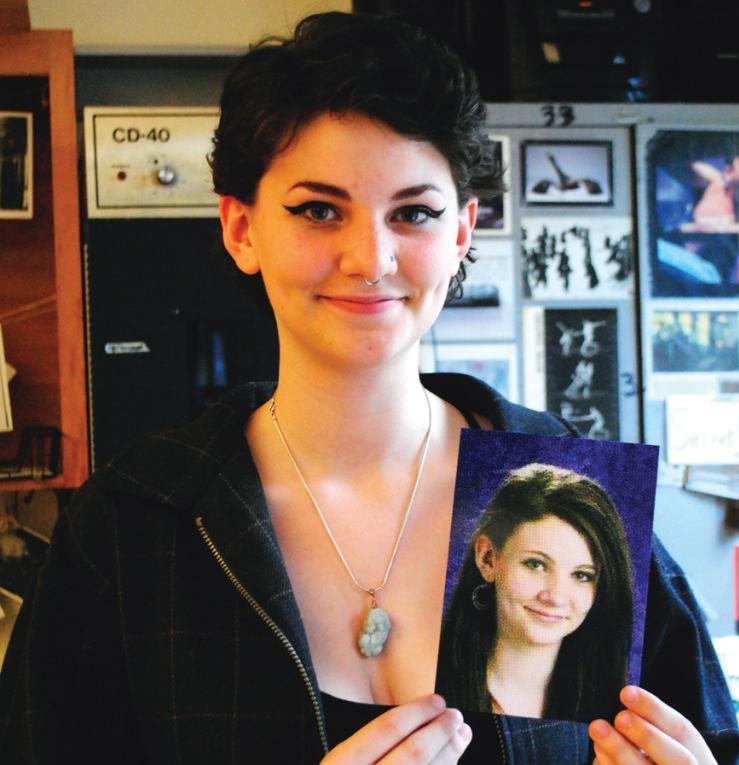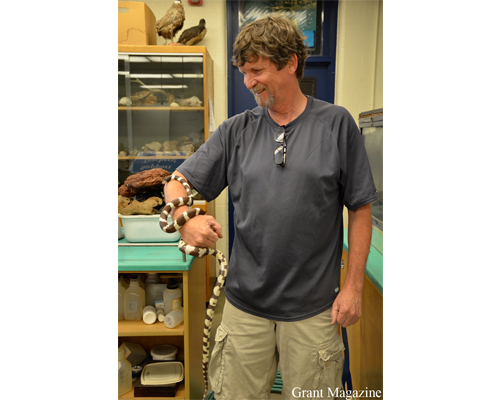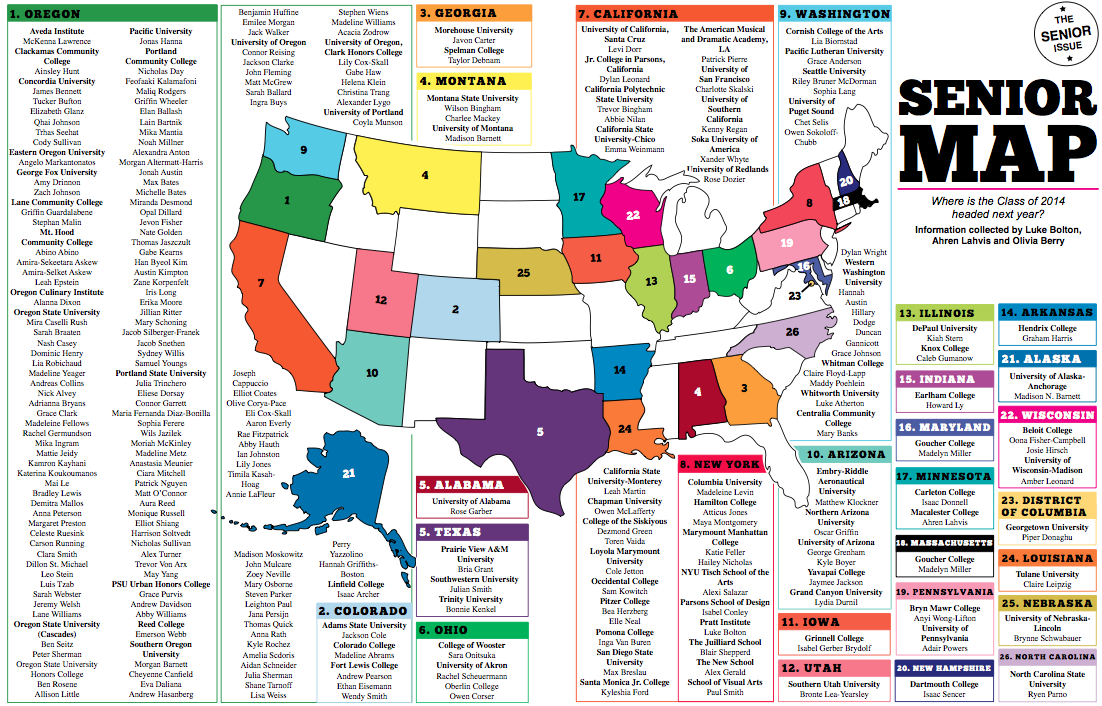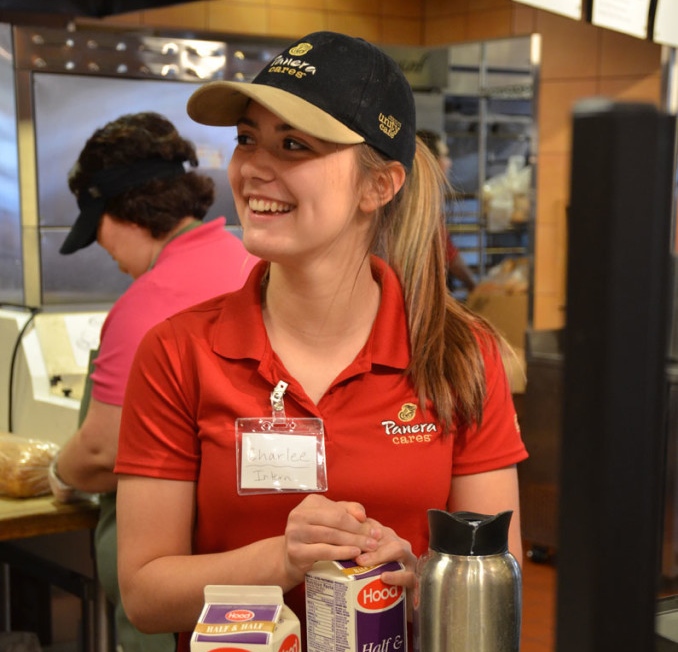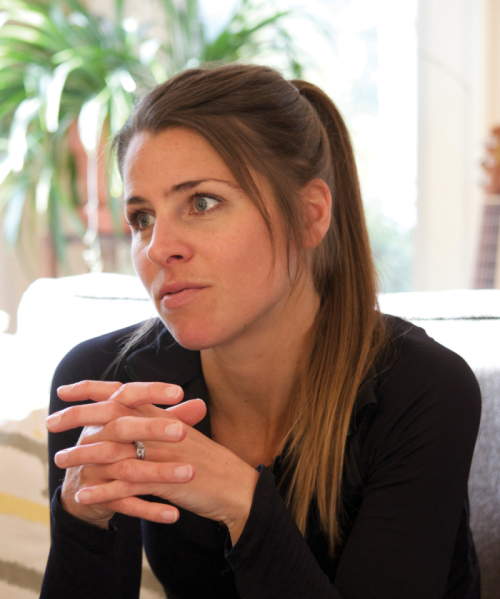
A gust of wind blasts the woman and pulls at her sail. The river sprays her legs as she rides over a wave, leaning to stay balanced.
Grant High School counselor Catherine Smith opens her eyes and is back at her desk, tucked away in the left side of the counseling office. A student is standing timidly by her door. She smiles and welcomes the youth in, back to reality after her windsurfing daydream.
Windsurfing is a vigorous sport that requires precise technical skills. But with a lifetime of experience, the motions come easy to Smith. She finds tranquility in the strong wind and pulsing waves beneath her board. But a year ago, her relationship with the sport changed when her father suddenly died.
Windsurfing was always a way to escape. It was her connection to her father. He taught her to windsurf when she was a kid. He was there when she struggled to find a job she loved. Now, expecting her first child in September, Smith is at a crossroads, and she’s learning to take on life without her biggest supporter and biggest fan. “I did really respect his opinion and his advice,” Smith remembers. Her parents “were people I leaned on for that support.”
Smith’s parents, Frank Kurz and Mary Wilcox, met in California and married in 1974. After Kurz finished medical school, the couple moved to Portland for his residency at Oregon Health Science University. When the children were born, Smith’s mom left her job to stay at home and take care of the kids.
In 1982, Smith was born in Southeast Portland as Catherine Kurz. A year and a half later, her brother, Michael, came along. The family was close-knit, often spending time together outdoors.
From a young age, Smith could never resist following her parents’ athletic footsteps. “My parents were very active, so we as a family were always very active,” she says. She tried soccer, basketball, tennis, track and dance.
“She’s pretty good at any active thing she tried, I mean, crazy good,” her brother says today with a laugh.
Their parents had discovered windsurfing in the Columbia River Gorge and introduced the sport to Smith and her brother at an early age.
She remembers her initial lessons at age 7: as her dad stood in the water holding onto an improvised tether, she would focus on keeping her balance. With her custom made sail (one-fifth the size of a regular sail), she always felt like she had a chance against the choppy waves. But whenever she finally gained control of the board it would jerk out from under her feet. She would hold tight to the board while her dad reeled in the rope and then she would try again. Four years later, she was taking on the waves solo.
Windsurfing was one way the Smith family members spent time together, when they could find the time to get away. On a daily basis, though, Smith’s mother made it a point to eat dinner as a family. “That was really important in my mom and dad’s relationship,” Smith remembers, saying sometimes it was hard to match up schedules. Kurz didn’t come home from work at his medical practice until mid-evening some nights, and Smith and her brother had sports practices. Everyone had to make an effort to find time for each other.
 It became more of a struggle in her teen years when Smith rebelled against her parents’ rules. Once, Kurz checked in on Smith when she was hanging out at a friend’s, only to find a bunch of teens partying. He quickly shut the party down and kicked everyone out. Smith was horrified and felt frustrated that her parents wouldn’t trust her, even when she gave them little reason to.
It became more of a struggle in her teen years when Smith rebelled against her parents’ rules. Once, Kurz checked in on Smith when she was hanging out at a friend’s, only to find a bunch of teens partying. He quickly shut the party down and kicked everyone out. Smith was horrified and felt frustrated that her parents wouldn’t trust her, even when she gave them little reason to.
Looking back, she says: “It would have been better, more peaceful if I realized I could have a relationship with them.”
Even hikes and bike rides turned into fights on the weekends when Smith wanted to be with her friends instead. Generally, her parents reacted calmly, uninterested in drama. By her junior year in high school, Smith realized how important it was to have a good relationship with her parents and got back her love of family excursions. “At a certain point he started talking to me more as an adult, more as an equal,” she says, remembering a turning point in her relationship with her dad.
She played soccer throughout middle school and high school, but windsurfing set her apart from her teammates. “I was different from a lot of friends of mine who were super intense about (soccer). We would always take off in the summer to the gorge,” she remembers.
Kurz made it to her games when he could, though being head of a medical practice meant he was often too busy. “He was around people all day as a doctor, so I think when he was done he was ready to unwind and just be with his family,” says Smith.
School was always a priority, and Smith worked hard to get good grades. “That was embedded internally. I put that pressure on myself,” she says. “It felt good to me.”
After high school, college was the obvious choice. Smith says: “I knew I wanted to go. That was always the goal.” She went to the University of Puget Sound in Tacoma, double majoring in international political economy and business administration. A job as a high school counselor was not on her radar. “Clearly I wasn’t going down that path in college,” Smith says today. However, she remembers being “really passionate about social responsibility,” explaining that she felt strongly about international affairs and helping people in need.
College allowed Smith to explore another passion of hers: traveling. Junior year, she flew to South America to study abroad. “I was always so fascinated and touched by other people’s stories. I was just very intrigued by travel and the idea of other cultures,” Smith says.
In all her trips, one thing stood out. “What really hit home for me was the concept of education being a privilege and how it’s such a key piece for the person involved,” she says.
“What really hit home for me was the concept of education being a privilege and how it’s such a key piece for the person involved.” -Catherine Smith
Smith sometimes encountered small towns with residents working hard to maintain one-room schoolhouses. “It was uncomfortable coming home,” she remembers, because the poverty she saw left her feeling guilty for the privileges she’d had growing up. These experiences would later push Smith to enter a career where she could help people on an intimate and community-wide level.
After graduating college in 2004, Smith began working in the international business field but was unimpressed and uninspired. Her only involvement with other people was on the phone, and she craved a more social job. When she began considering a different career, her dad helped her get on the right path. Smith remembers: “He wasn’t afraid to ask what my thought process was or what I was trying to get out of a job.”
Back in Portland, Smith met her future husband, Jake Smith. “He had to woo me,” she jokes, referring to the dates and long phone calls the pair shared. While they were dating, Jake Smith lived in San Francisco, so most of their conversations were held over the phone. Smith had her doubts about being in a long-distance relationship, and her uncertainty played a part in the success of their connection because she left nothing out. “I was an open book with him,” Smith says.
One day in 2007, after an entire day snowboarding together, they had dinner and caught a concert. It was after this date that she realized how well they worked together. In 2011 they got married in the gorge. Smith remembers the happiness of her special day: “There’s lots of good people all in one place, you want it to last forever.” The two went to the Dominican Republic for their honeymoon.
Although Smith loves to travel, she eventually chose to remain in Portland. “I love meeting new people but I need a place to stay put,” she says. “I really wanted to have a community of people.”
Looking for a career change, Smith hoped to combine her interests in education and personal communication. That’s when she entered the graduate program at Lewis & Clark College to become a school counselor. “It was worth the investment to go somewhere where there’s the network and the connections to get a job afterwards,” Smith says now.
Her connections to the windsurfing community played a part in landing her dream job at Grant. A man she knew from Windsurfing Magazine was taking a yoga class taught by Grant counselor Megan Schlicker. The two began chatting about Smith and her interest in counseling.
This led to Smith interning under Schlicker, where she was able to learn more about counseling and Grant. Later, Smith was accepted for a position as a school counselor.
Her brother remembers being surprised at the career choice, but her parents were excited and supportive. Smith remembers her dad in particular “thought it was a good fit.”
She feels the things she does in counseling are similar to aspects of her father’s personality. “He was good at connecting on a smaller setting,” Smith remembers. “He’d be connecting one-on-one with someone on the side.”
Unlike in her previous job, at Grant Smith was able to communicate with people face-to-face and get involved in their lives on a more personal level. The job requires social skills and business professionalism. “There’s not a drug and alcohol counselor, there’s not a college counselor, or career counselor. It’s all piled into one,” Smith says.
Reflecting on Smith’s dedication inside and outside of school, Schlicker jokes: “I think she thinks about her students when she’s at home.”
Vice Principal Kristyn Westphal says: “She is always willing to go the extra mile and check in with her students.” In particular Smith enjoys going on college trips with students to lead them through the process. She is proof that changing majors or careers is OK.
But a few years after everything had fallen into place, Smith received a phone call that changed her life forever. Her father unexpectedly had a brain aneurysm. He was in a coma at Legacy Emanuel Hospital. After multiple surgeries, there was nothing more the doctors could do.
“You never expect to get that phone call,” Smith says. “There are some things you can prepare for, which counseling helped with for sure. But you have to be open because you never know till it happens what will help you.”
Smith’s brother recalls that his sister’s training as a counselor helped the family. “She knew how to help our family deal with it, and even herself,” he says. Ultimately, time was the only factor that could ease the pain of their loss.
Schlicker remembers: “She thought she understood something about what her students were going through when they had loss of parents, but she realizes now she didn’t. The grief is so big.” She adds how amazed she and the other staff have been at how Smith remained positive through the loss.
One thing Smith remembers is her dad’s effort to hold meaningful conversations, often asking deep questions in the midst of holiday meals. “You really have to be intentional to make those conversations happen because people are pretty resistant initially to be vulnerable or intimate,” Smith says.
When her father met Jake the conversations were no different. They shared a love for the outdoors, windsurfing and Smith. When Smith lost her father, Jake lost a father figure too. “He’s been a role model for Jake,” says Smith now. “I’m just so thankful that he got to know him because he’s such a big part of my life and who I am.”
“It’s kinda scary to think of being a parent.” -Catherine Smith
She relishes the deep conversations she had with her father. At his memorial, she learned he had initiated many conversations outside of their family dinner table with others, and in doing so had left an imprint on many more people.
She also remembers how her dad rarely sat idle. During a trip to the beach last year, he stepped on a sea urchin. He spent one day on the couch letting the sharp spikes dissolve, and then he returned to kite boarding the next day. It left Smith with a rare memory. “One of the only pictures I have of him sitting down is him laying down on this couch. We were never sitting around,” she says.
Today, her family still makes the trip to the gorge where they spread her father’s ashes. For Smith, windsurfing has always been more than a sport: it’s therapeutic, and it gave her a community. Now, windsurfing is also a way to reconnect with her dad, reliving old memories.
This new chapter in Smith’s life comes with other changes, too. With her first child due in September, for the next several months Smith is forced to take a break from all contact sports. This summer, during the prime time for windsurfing and kite boarding, Smith will be on the sidelines.
Even harder, Smith will have to miss work. But with her usual determination, she says: “I plan to come back until I can’t.”
She is still coming to terms with the fact that her dad is no longer a phone call away. “Being pregnant, you have weird things happen,” she says. “I would love to just call him and ask him. I’m not used to calling the doctor’s office.”
Smith admits her fear of taking on the rest of life’s challenges without her father’s guidance. “I would have wanted to lean on him a lot,” she says. “It’s kinda scary to think of being a parent.” But she holds her parents’ best qualities in mind as she gets closer to being a mother, saying, “I hope I can have as much patience.”
With tears in her eyes, Smith says: “He would have been a great grandpa.” ♦
































